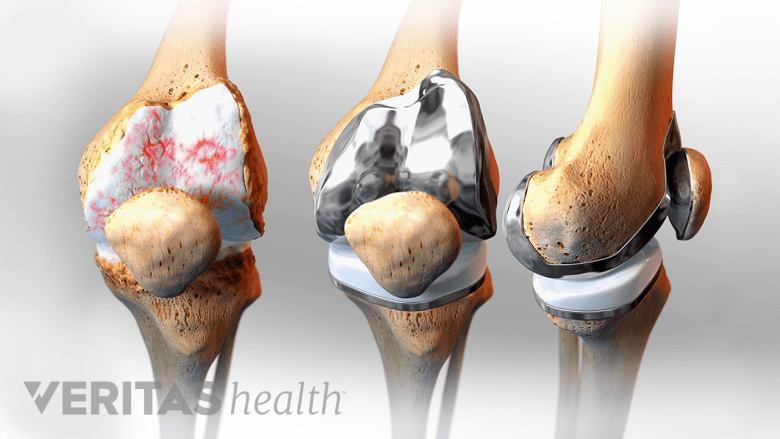A doctor can present knee replacement surgery as a treatment option, but whether or not to have the surgery is up to the patient. Some patients choose to have knee replacement surgery as soon as their doctors suggest it. Others want to avoid surgery or postpone it as long as possible.
In This Article:
- When to Consider Knee Replacement Surgery
- Scheduling vs. Postponing Knee Replacement Surgery
People considering knee replacement are advised to consider 3 questions: How does knee pain affect lifestyle? Have other treatments been exhausted? and What are the risks related to not having surgery?
How Does Knee Pain Affect Lifestyle?
How pain is perceived and tolerated is unique to each individual. If knee pain affects working, socializing, sleeping, maintaining good hygiene, or other daily activities, then it may be time to consider knee replacement surgery.
Knee pain and active lifestyles
People who live active lives may be more affected by knee pain and decide to have knee replacement surgery sooner. For example, a person whose regular activities include standing for work, babysitting grandchildren, and walking a pet dog may be more affected by arthritic knee pain than a person who lives a more sedentary life.
Pain and joint damage do not always match up
The decision to have knee replacement surgery should not be based solely on medical imaging (such as an x-ray or MRI) that shows severe knee degeneration. Rather, it should be based on moderate to severe knee arthritis symptoms that correlate with medical imaging.
See Knee Osteoarthritis Diagnosis
For example, a person whose x-ray shows a severely degenerated knee but who experiences only mild pain is probably not a good candidate for knee replacement. In contrast, a person who has a moderately degenerated knee and experiences severe pain may be a good candidate for knee replacement.
Have Other Treatments Been Exhausted?
Experts typically recommend that anyone with knee osteoarthritis pain try nonsurgical treatments before considering knee replacements. Nonsurgical treatments include, but are not limited to, engaging in physical therapy and exercise, bracing, losing weight, taking pain medications, and getting therapeutic knee injections. (Some doctors may recommend PRP or stem cell injections, though these are not considered standard treatments.)
See Therapeutic Injections for Knee Arthritis
If 3 to 6 months of physical therapy and other nonsurgical remedies have been tried—in earnest—without a notable reduction in pain, then knee replacement surgery may be a good option.
See Knee Osteoarthritis Treatment
What Are the Risks Related to Not Having Surgery?

Knee replacement surgery aims to alleviate pain caused by moderate to severe knee arthritis.
Knee osteoarthritis can affect joint biomechanics and increase the risk for falling, bone damage at the knee, and other wear-and-tear injuries.
The risk of falling
Falling can result in life-altering injuries, particularly as people age. If knee arthritis symptoms include a sensation that the affected knee may buckle, or if there are other risk factors for falling, knee replacement surgery may be advised.
The risk of bone damage
Moderate to severe knee osteoarthritis can result in damaged bone. Bone damage can reduce the likelihood of a successful knee replacement surgery.
Knee arthritis is a progressive, degenerative condition, meaning the joint damage gets worse over time. As knee cartilage wears away, friction can occur between the bottom of the femur (thighbone) and top of the tibia (shinbone). Over time, the friction can lead to bone damage.
There is no surefire way to predict if and how fast bone tissue will become damaged. However, medical imaging can evaluate the current bone health of the knee joint.
The risk of joint problems
Arthritic knee joint degeneration can cause changes to knee biomechanics, which in turn increases the risk of developing other joint problems. For example, when knee pain causes conscious or unconscious changes in gait, hip problems may develop over time.
A physician or physical therapist can evaluate the knee’s biomechanics and help identify other existing or potential joint problems.
Making the Choice to Have Knee Replacement Surgery
A physician can discuss a patient’s unique life and health circumstances and help the patient make an informed choice about whether to have knee replacement surgery.
See Questions to Ask Before Knee Replacement
Some patients may decide they want to have knee replacement surgery, but at a later date.

